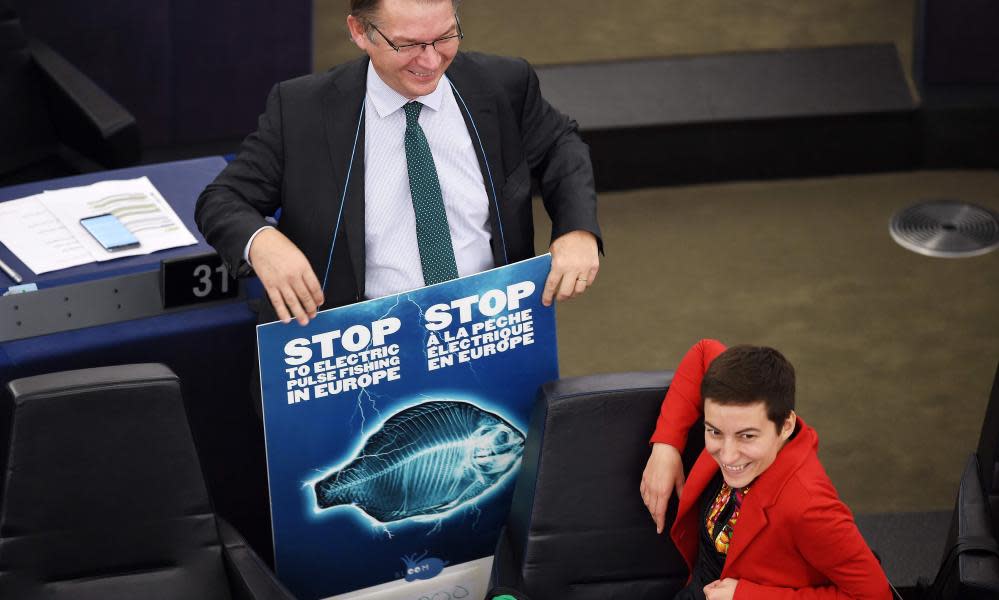European parliament votes to end electric pulse fishing

The European Union’s parliament has voted to prohibit the controversial practice of electrical pulse fishing within EU waters, to the approval of some groups of small-scale fishermen and green campaigners.
However, a series of other measures designed to prevent overfishing and preserve the marine environment were voted down. Campaigners say the rejection will have a damaging effect on Europe’s fisheries for many years.
Tuesday’s votes will still have to be discussed among member states, the European commission, and parliament before approval, so this decision is not yet final. However, the step is a landmark for activists who say pulse fishing is harmful.
Pulse fishing uses electrodes attached to nets to send electrical signals close to the surface of the seabed, driving some fish to move into the nets. Proponents say it is efficient and avoids the damage of bottom trawling, by which the seabed is effectively ploughed in order to catch fish living there. Opponents say it is cruel and could cause pain to fish and damage to their habitats.
The practice was banned in 1998, but in 2006 a derogation was allowed that has been exploited, especially by the Dutch fishing fleet. At least 84 Dutch vessels are licensed, along with a small number from other member states, including 12 in the UK.
If the parliament’s vote is upheld without loopholes, all would have to cease.
However, in the UK, the National Federation of Fishermen’s Organisations has not yet decided whether to support pulse fishing after Brexit. Chief executive Barry Deas, told the Guardian it was still under discussion.
Campaigners said other votes passed on Tuesday will leave European waters in a worse state.
MEPs voted against quantitative binding targets to reduce the catch of small young fish, which is essential to ensuring fish can reproduce. These decisions are also subject to further approval, so could be reversed, but given the vested fishing interests in many EU governments that may be unlikely.
Björn Stockhausen, fisheries policy officer at the Seas At Risk alliance, said: “The European parliament has weakened the measures that have granted protection to European seas for decades. These new diminished rules will undermine the health of marine ecosystems and the stability of fish stocks.”
Stockhausen added: “As a result [of the votes] the future of the ocean and the protection of ecosystems are at risk. Except for the electric fishing case, this regulation is unacceptable as it stands now. We are not convinced that the trilogue negotiations [among member states, the commission and the European parliament] will improve the situation at all.”
While Green MEPs backed the ban on pulse fishing, they voted against the full report on the conservation of fishery resources and the protection of marine ecosystems, saying they failed to establish common objectives at an EU level. Molly Scott Cato, the UK Green party MEP, said: “MEPs have ill-advisedly signed off a set of conditions that provide no incentive to improve fishing techniques and could result in massive illegal discarding. If the commission proceed with their proposals the EU will be taking a major step backwards from the significant advances made in the reform of the common fisheries policy a few years ago.”
If the votes are confirmed, without targets on juvenile fish and the size of fish which can be caught, it will be up to regional groups of member states to determine and implement regional recommendations in order to achieve the reductions.
In the UK, it is unclear what the situation will be post-Brexit. The EU is insisting that during the transition period, likely to last two years after Brexit is formally triggered next March, the UK must stick to its fishing quotas under the EU’s common fisheries policy.
After that, fishing groups want the UK to set an independent policy. However, given that many of the UK’s key fishing grounds are shared with other nations, this may require complex negotiations with uncertain outcomes. Fishing groups were among the leading backers of Brexit.

 Yahoo News
Yahoo News 
